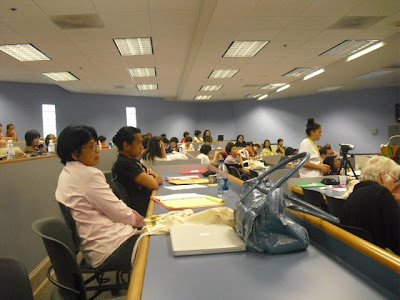Chinemma', Nina'maolek yan Inarespetu para Direchon Taotao
 Activists explore post-military economy
Activists explore post-military economyFriday, 18 September 2009
Marianas Variety
PEOPLE will have to work together if they want to sustain an economy after the military. This was emphasized during the fourth day of the 7th Meeting of the International Network of Women Against Militarism at the University of Guam in Mangilao.
The morning a panel focused on the topic “Beyond the Military Economy: Exploring Alternatives for Sustainability.”
Participating were Alma Bulawan of the Buklod Center Philippines, Dr. Hannah Middleton of the Australian Anti-Base Campaign, Dr. Miyume Tanji of Curtin University of Technology in Australia, and Isabella Sumang of Palau.
Each panelist gave a perspective of the impact the military has had on their respective regions.
 Bulawan had indicated that when there were bases in the Philippines, businesses were set up to cater to the military as well as prostitution. It appears now that with those bases closed, businesses and the prostitution still remain.
Bulawan had indicated that when there were bases in the Philippines, businesses were set up to cater to the military as well as prostitution. It appears now that with those bases closed, businesses and the prostitution still remain.She referred to the Subic Bay and Clark Freeport Zones, which formerly hosted the U.S. Naval Base and the Air Force Base and have each seen the creation and development of businesses.
Despite the conversion of the old bases, Bulawan said the Philippines continues to face economic challenges.
As for Australia, Middleton explained how millions of Australian dollars are spent on military defense and other armed forces programs. A recent poll showed that 70 percent of Australians do not want any more money spent on the military.
She added that the Australians believe the money should go on helping the environment, improving hospitals and even to create jobs.
“We expect one million Australians will be unemployed in 2010, money should be spent to help them find jobs,” she said.
During the open forum, several concerns were brought up including a question on whether they felt that the threat of an invasion and war is real here in Micronesia.
Sumang responded that it could be the case especially when there is a military presence. “You have that threat hanging over your head,” she said.
Middleton offered another perspective saying that the threat is an excuse to keep military bases in the region.
“It’s not real,” she pointed out.
The women’s conference concludes today at the Carmel on the Hill Retreat Center in Malojloj or the former Carmelite Convent.
Participants are expected to discuss Human Trafficking and Prostitution and gather together in group meetings to develop short term and long term goals.
**********************************
*********************************
Women's conference against militarism held
By Heather Hauswirth
Published Sep 14, 2009
KUAM News
 The 7th meeting of the International Network of Women Against Militarism began today. Women from all around the region are on island to attend the weeklong event with the theme of "Resistance, Resilience, and Respect for Human Rights."
The 7th meeting of the International Network of Women Against Militarism began today. Women from all around the region are on island to attend the weeklong event with the theme of "Resistance, Resilience, and Respect for Human Rights.""We are very much concerned that women are still seen as a commodity," said Philippine delegate Gorazon Requizo. As the island prepares for the impending military buildup, participants attending this week's conference say we can expect to see more human trafficking. Requizo, a native of the PI, provided insight as she grew up near the Olongapo Province that once hosted one of the largest United States military installations.
"We are advising since there will be a military expansion now here in Guam, we must challenge the women, especially the women and people of Guam to have a very strong resistance movement to this implementation," she said.
Concerns have been raised about the relocation of thousands of Marines from Okinawa to Guam, as there were concerns in Okinawa about the Marines behavior and sexual misconduct. Victims Advocates Reaching Out executive director Vangie Cabacar said, "It's a big concern for us, our numbers are high from sexual assault cases already, the lack of federal funding is another problem."
VARO is just one of many organizations in Guam involved in the dialogue about how to mitigate the impact, but Speaker Judi Won Pat says a full pronged approach is needed. Asked if she was planning on taking any preemptive measures to protect them, she said, "Yes, absolutely." The speaker warned that talk of a red light district by GVB and individuals at the Chamber of Commerce are of concern to her.
"A possible red light district, moving them out of Tumon and at that time to Harmon, but I think this is a bigger problem. We need to look at the whole picture. We need to look at our community and what it is we need to do to protect women and young girls," she said. Won Pat says she plans to create a blue ribbon committee to counter exploitation and to help create policies to ensure the safety of women and children.
Said Won Pat, "This is going to be a policy for Guam, I know we can't legislate or mandate anything for the military, but when their men come into the community, they would have to abide by the local law." Dr. Vivian Damas, UOG professor and committee member at the conference said that while a law that defines human trafficking has been passed, there is still more to be done. "Regulation of massage parlor, reporting of violence versus women and children both on the base and off the base, if we don't do that and we don't work out the coordinated agreements, we are going to have a huge problem on this island."




Comments